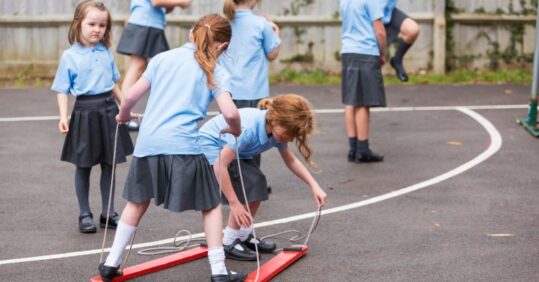Outdoor playtime for children could reduce the harmful effects of screen time by almost 20%

Playing outdoors can reduce some of the negative effects of screen time on children, according to new research.
Children who spend more time in front of screens, including tablets, phones, computers or televisions, have been found to have poorer communication and daily living skills at age four.
If young people are allowed to play outside, one-fifth of the effects of screen time on daily living skills can be mediated.
Related Article: Diagnosis Connect service will link people to advice from charities
The researchers from Osaka University in Japan also found socialisation was better in 4-year-olds who had spent more time playing outside at two years eight months of age.
The findings are published in JAMA Pediatrics.
The World Health Organization recommends no screen time for babies under two and no more than one hour a day for those aged two to four. In the UK, children between the ages of three and four now spend an average of 29 hours in front of screens per week, including playing games, watching TV and participating in other online activities.
The new research followed 885 children from 18 months to 4 years of age. They looked at the relationship between the average amount of screen time per day at age two, the amount of outdoor play at age two years eight months, and neurodevelopmental outcomes, specifically, communication, daily living skills, and socialisation scores. The neurodevelopment scores were calculated using the Vineland Adaptive Behavior Scale II – a standardised assessment tool when the children reached four years of age.
Increasing the time children spend outside playing was found to reduce the negative effects of screen time by almost 20%. Specifically, the researchers found that daily living skills were mediated by outdoor play, and children were more able to carry out age-appropriate tasks if they had more outdoor playtime.
Although socialisation amongst the children was not linked to screen time, the findings suggest that four year olds who had spent more time playing outside when they were two were better at interacting socially than children who had spent less time outside.
Related Article: CVD prevention must be national health priority, says report
Professor Kenji J. Tsuchiya from Osaka University and lead author of the study said: ‘Although both communication and daily living skills were worse in 4-year-old children who had had more screen time at aged 2, outdoor play time had very different effects on these two neurodevelopmental outcomes.’
He added: ‘We were surprised to find that outdoor play didn’t really alter the negative effects of screen time on communication—but it did affect daily living skills.’
These results are significant given the recent Covid-19 lockdowns worldwide, which have often led to more screen time and less outdoor time for children.
Tomoko Nishimura, a senior author of the study from Hamamatsu University, added: ‘Our findings indicate that optimising screen time in young children is really important for appropriate neurodevelopment. Even if screen time is relatively high, encouraging more outdoor play time might help to keep kids healthy and developing appropriately.’
Related Article: Postnatal contraception advice reduces the risk of back-to-back pregnancies
The researchers acknowledge that the use of digital devices is difficult to avoid, even in very young children and would like to expand their work to understand more about how we can balance the risks and benefits of screen time for young children.

See how our symptom tool can help you make better sense of patient presentations
Click here to search a symptom




